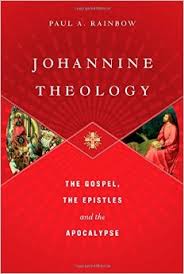Book Notice: Johannine Theology: The Gospel, the Epistles, and the Apocalypse by Paul A. Rainbow
 Paul A. Rainbow. Johannine Theology: The Gospel, the Epistles and the Apocalypse. Downers Grove, IL: IVP Academic, 2014. Pp. 496. ISBN: 978-0-8308-4056-4. $40.00 [Hardback].
Paul A. Rainbow. Johannine Theology: The Gospel, the Epistles and the Apocalypse. Downers Grove, IL: IVP Academic, 2014. Pp. 496. ISBN: 978-0-8308-4056-4. $40.00 [Hardback].
* * * * *
Paul Rainbow—Professor of New Testament at Sioux Falls Seminary—presents us with a magisterial-like work on Johannine theology. Even after writing this large volume and nearing 60 pages of bibliographic data, Rainbow says, "As far as I am aware, this volume is the only English-language textbook on John's theology that aims to be both critical and comprehensive" (p.9). Although not assuaging all critical Johannine scholars, Rainbow does attempt to be cognizant of broad Johannine critical literature. It is comprehensive, in that it interacts with all the New Testament books ascribed to John: the Gospel, three epistles, and the Apocalypse.
The theology of John is argued via the following chapters:
- Introduction: State of the Question and Critical Issues
- The Revelation of God (The Father)
- The World
- God's Self-Revelation in Christ's Person
- God's Self-Revelation in Christ's Work
- The Revelation of the Father in the Son by the Spirit-Paraclete
- The Believer and the True God: Coming to Christ
- The Believer and the True God: Abiding in Christ
- Disciples of Christ in Community
- The Community of Christ's Disciples
Rainbow's volume is reminiscent of two other works in Pauline scholarship: the theological focus of Thomas R. Schreiner in Paul Apostle of God's Glory in Christ and the critical detail of James Dunn in The Theology of Paul the Apostle. Thus, Rainbow is providing for Johannine theology what the combined efforts of Schreiner and Dunn are to Pauline theology.
Rainbow offers the following insight on the nature of history and theology as it relates to the Gospel of John. He offers a historical and theological sensitive observation to a highly problematic problem in historical Jesus scholarship and a purely theological reading.
According to John, then, to know Jesus of Nazareth as he was is to encounter God's supreme self-communication. To come to grips with the history is to be overwhelmed by the reality. John's special material, which is most of it, parallels the Synoptic accounts in kind. His meditative way of conveying the words of Jesus magnifies, clarifies and intensifies the tendency of the Synoptic portrayal of Jesus with incrementing its substance. Far from falsifying history in the interest of theology, John has an eye for small incidentals, not previously captured by other Evangelists, that confirm the same picture of the God-man. (p.69
Although the text is thoroughly conversant with secondary literature—a look at the sustained attention given to the footnotes will attest to this great feat, I fear that it may not be as comprehensive in Johannine theology. First, the table of contents seem to reflect the theological categories of the Gospel of John. Second, a brief look at the scripture index reveals an overt focus on the Gospel of John. Moreover, the entries for 1 John outweigh the entries for the Apocalypse. Chapter 9 of the book, on the related themes of community, makes one reference to Rev 2–3 and the seven churches given in a single sentence. Moreover, no mention of Rev 14–19 is mentioned in the entire book.
Albiet a lack of Revelation texts, Rainbow has given Johannine literature and students of New Testament theology a great service. This along with theological monographs on Revelation—such works from Richard Bauckham and Greg Beale—will surely be readily available on theological bookshelves when reading Johannine literature.
Other endorsements come from:
Michael F. Bird
Paul Rainbow attempts an ambitious task of plotting the theological coherence of the Johannine corpus. His study of the Gospel of John, letters of John and Apocalypse of John demonstrates time and again that they share a common theological fabric. Rainbow brings together what many have rent asunder, and he enables readers to appreciate the Johannine testimony to the revelation of God the Father in the life, death and resurrection of Jesus Christ. A well-researched and well-crafted book destined to help students and pastors wrestle with the whole breadth of John's writings."
Scot McKnight
Exegetically intricate, bibliographical exhaustive, theologically alert, historically judicious and hermeneutically traditional....Johannine Theology may well become an encyclopedia for Johannine studies for decades to come.
Craig Blomberg
After a flurry of Johannine theologies appearing in the late 1970s through the mid-1990s, the fourth Gospel has been less well served in recent years. Here is the first book-length treatment of the major themes of all five of John's writings, synthesized into one grand collection of data and discussions. Abreast of the full range of scholarship on each topic and subtopic treated, Rainbow's work still reads as if he began with an inductive study of the texts themselves in the Gospel, the three epistles and the Apocalypse, so that his summary points clearly emerge out of the text of Scripture, analyzed in considerable detail. Warmly to be welcomed.



